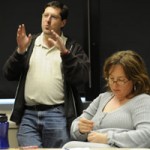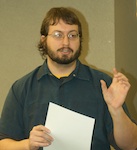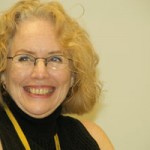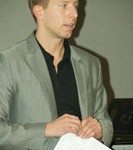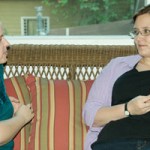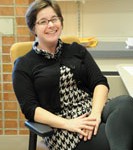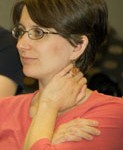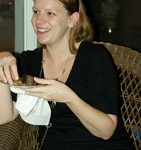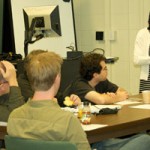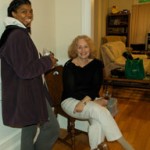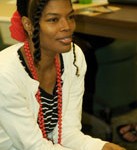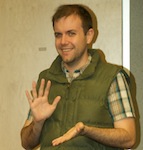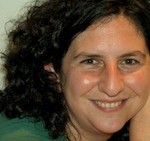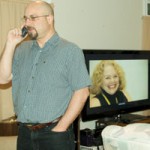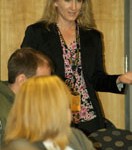We asked Brittain Fellows who will be moving on from the program to reflect upon their experiences. Four Britts rose to the challenge; as you’ll see, the perspectives of Jo Anne Harris, Crystal Lake, Melissa Meeks and Paulette Richards are varied but share an enthusiasm for the time they have spent at Georgia Tech :
Jo Anne Harris
“Confessions of an Academic Creole”: As May 9 –and the end of my Brittain Fellowship –rapidly approach, I am tempted to state the usual “I’ve learned so much”, “My teaching has been forever changed”, “I didn’t know it was going to be so much work “, to “My, God, I hope this gets me a job”. However, in the spirit of Brittain camaraderie, I must confess that I arrived at Georgia Tech as an academic Creole, and am leaving as an academic Creole; albeit, a very changed one.
When I arrived at Georgia Tech, I was returning to live in the USA for the first time since 1975 and despite my newly printed PhD, discovered that I did not speak “Academic “ English, nor did I understand Georgia Tech acronyms, or the American fetish for being “on time”. In short, my PhD experience in “mañana-land” had left me with the impression that leisurely postcolonial musings with a rag-tag bunch of expat academics (undergrads, tenured, non-tenured, and even the non-degreed, but well-read) in Old San Juan bars, or on island beaches –always with a piña colada or rum punch in hand –were the norm. After all, one of my doctoral linguistics courses had been a three-week field trip to St. Croix to interview creole speakers. And part of my archival research transpired in the basement of a Dutch windmill. Alas, after the first day of orientation in Skiles 343, I discovered that, not only did I not understand the lofty rhetoric of US academia, but I was no longer Southern–somehow life in the islands had made me that which I had studied –a Creole. I was born in Atlanta, but years of island life and a Caribbean PhD had totally, absolutely, left me a stranger in my hometown – I had an identity crisis.
Now, after three years of intense Georgia ‘Techiness’ and a gaggle of Brittain seminars, I am somewhat pleased to say that while not fully fluent in “Academic English”, I can understand the gist of most conversations. I feel comfortable when I email HR, OIT, or walk to the CRC; my bus stops at the GLC, and when my students tell me they are BE’s, ME’, or IE’s, I fully understand the nuances. I now realize that my former propensity for variety in teaching, has become “multimodality”, and that what I naïvely thought was computer assisted writing has blossomed into full-blown “digital pedagogy”. Thanks to the Brittain Fellowship, I am poised and ready to join some [? undetermined] Hall of Academia.
Unfortunately, I must confess that this little reflection is now 400 words (not the 200 suggested), that I am starting it late on the afternoon of May2, and . . . that in 11 days I will be sitting on a beach in Puerto Rico with my fiancé, sipping a rum punch, speaking “Island English” with a rag-tag bunch of expats eager to learn about multimodality and digital pedagogy . Yep, I am still an academic creole.
Crystal Lake
In his Essay on the Origin and Importance of Small Tracts and Fugitive Pieces, Samuel Johnson observed that “the mind once let loose to inquiry, and suffered to operate without restraint, necessarily deviates into peculiar opinions, and wanders in new tracks, where she is indeed sometimes lost in a labyrinth from which though she cannot return, and scarce knows how to proceed, yet…makes useful discoveries, or finds out nearer paths to knowledge.” Having spent three years as a Brittain fellow, I leave for Wright State University grateful for the opportunity to wander “without restraint” in the “labyrinth” of Georgia Tech’s Writing and Communication Program. At times, combining digital humanities, multimodal communication, and eighteenth-century British literature has made me appear to “deviate into peculiar opinions,” but these “new tracks” have been, without a doubt, “useful discoveries.” Indeed, I “scarce know how to proceed” to leave Tech. I will miss the other Britts’ contagious enthusiasm, creativity, and commitment to innovative, multimodal teaching; I will miss learning about the exciting research being undertaken by the Britts and other faculty; I will miss my students’ seemingly endless capacity for thinking about historical literatures in radically new ways. In many ways, I suppose won’t leave; my scholarship and teaching have been dramatically changed by my experiences as a Britt.
Melissa Meeks
For me, the Brittain fellowship represented opportunity. The supportive climate for innovation enabled me to do my very best teaching. I expanded not only my use of technology but also my range of courses. My work with wikis led to two poster presentations and a publication. Teaching UROP’s LCC 4701 course has been a highlight of my professional career.
Although teaching was a clear priority in the program, being a Brittain fellow opened opportunities outside the classroom as well. I worked with others to brainstorm the WOVEN portfolio and to think about its long-term policy implications in lieu of Regents’ requirements. I also worked as a consultant on two publications for OIT and made connections with the GT1000 program—both experiences led me to other projects.
Because of Rebecca and Andrew’s hard work, an abundance of opportunities in, near, and beyond the classroom exist for Brittain fellows. Those opportunities taught me that I have a versatile skill set at a time when I struggled to know if I was skillful at all. I will sincerely miss being part of the Brittain’s energetic, collegial scholarly community. And I will certainly miss having such a strong administrative team actively seeking more opportunities to make multimodal literacy matter.
Paulette Richards
“The Revolution Will Not Be Televised, We’re Uploading it to YouTube”: Three years ago I was excited to come to a school where enough cutting edge technology was available for students to produce digital video as technical discourse. The logistics of reserving cameras, scheduling training sessions for editing in iMovie, and resolving issues with incompatible file formats were daunting, but by the end of my first semester, my 75 Tech Comm students had each produced a 60 second video resume.
I have been incorporating video projects into my courses since 1995, but in three short years, the technology has advanced enough to put the power to produce video literally in students’ pockets. In one class period this spring, many of my students shot instructional videos about folding paper airplanes with their smartphones, uploaded the clips to You Tube, and then edited them with You Tube’s editing tools. The next class period we did usability testing by exchanging the instruction sets and launching the planes on test flights in Skiles courtyard.
In the midst of this exercise, one of my students remarked on the odd impression that casual observers might have formed if they had passed by and seen paper airplanes whizzing back and forth across the classroom. On other days they might have wondered what all the heavy breathing was about as I introduced the students to breath and relaxation techniques they could use to project their voices more effectively during oral presentations. Or they would have seen students standing around in “wife beater” tank shirts in between wardrobe changes as we tested how 24 different colored t-shirts affected the quality of images captured with low resolution cameras under poor lighting conditions – the typical mise on scene for video web conferencing.
What I have appreciated most about teaching in the Writing and Communication program at Tech is the encouragement to pursue innovation in multi-modal pedagogy. It has been wonderfully refreshing to work in an environment with colleagues who understand that the most revolutionary advances in teaching writing and communication will not be televised. The revolution is streaming live.
Thanks to Jo Anne, Crystal, Melissa and Paulette for contributing their reflections. In recognition of all our departing Britts, here is a gallery of candid snapshots. We wish all departing Brittain Fellows the very best in everything you do – we’ll miss you!
- King Adkins and Ruth McIntyre
- Andy Famiglietti
- Jo Anne Harris
- Jared Johnson
- Melanie Kohen and Irene Middleton
- Crystal Lake
- Melissa Meeks
- Jen Parrott
- Paulette Richards with Brittain Fellows
- Paulette Richards and Jo Anne Harris
- Paulette Richards
- Rob LeBlanc
- Roger Whitson
- Pete Rorabugh
- Rebekah Sheldon
- Dan Vollaro and Jo Anne Harris
- Candice Wellhausen

